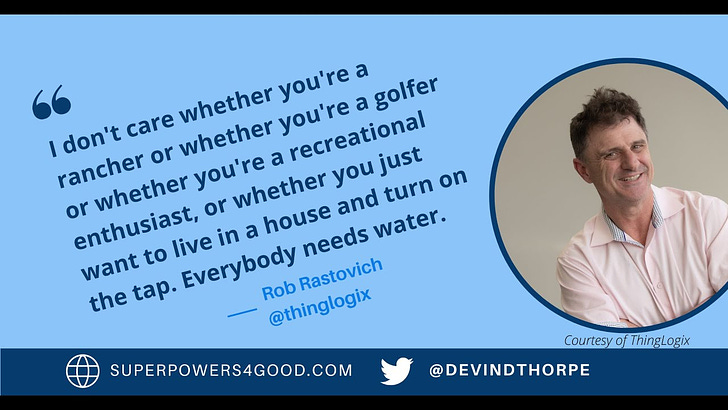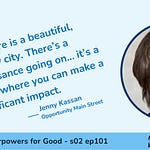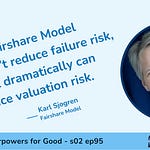Devin: What do you see as your superpower?
Rob: I make people feel comfortable.
Ranching today on the central Oregon land his grandfather homesteaded more than 100 years ago, Rob Rastovich also works as the Chief Technology Officer for IoT company ThingLogix, based in Silicon Valley. Sustainability has become the common thread between these two worlds.
Within broader discussions of sustainability, water has become a focus for Rob both in Oregon and in Silicon Valley.
the U.S. Geological Survey or USGS is a client of ThingLogix. The work focuses on water.
“I don't care whether you're a rancher or whether you're a golfer or whether you're a recreational enthusiast, or whether you just want to live in a house and turn on the tap,” Rob says. “Everybody needs water.”
Using ThingLogix technology, Rob says the USGS is monitoring the volume of water flowing through drought-prone western waterways to better predict and manage water.
“Their interest in it is not just for irrigation and farmers and all those other things—for flood prevention and whatnot—but also for wildlife,” he says. “If you can't measure it, you can't management can't manage it.”
One of the products Rob has helped develop is a “fertigation” system, “a combination irrigation and fertilizing system.” He describes it:
There is a sensor that goes in the soil, and that sensor reads the data coming out of the soil and tells the irrigation system, you know, how much moisture it needs and what nutrients it needs. Does it need phosphorus? Does it need nitrogen? What does it need? So it sends a message back to the pump. The pump turns on, the valve opens, sends that plant exactly what it needs. No more, no less.
In all his work, Rob leverages his superpower, making people feel comfortable.
How to Develop Making People Feel Comfortable As a Superpower
“You can’t get more down-to-earth than [ranchers and farmers],” Rob says. That underpins his well-honed ability to help people feel comfortable around him.
Rob says, “A lot of technology guys, they like to come in, and they start throwing, ‘We're going to do DNSs and SQL statements, and we're going to do MQTT over HTTP, and we're going to do..."
In contrast, Rob has another approach. “ I like to talk about the solution; I think that's the rancher in me. It's like it has to be a practical solution that is is is viable, is affordable, and, and we know how to do it.”
Rob highlights three things that contribute to helping people feel comfortable.
“You listen first,” he says. There is magic in simply listening to people.
Hard work is the second key. “There's a work ethic that comes with when you're on a ranch. I always, always tell them, tell anybody. I mean, you'll be smarter than me, you'll be faster than me, you'll maybe live longer, but you won't outwork me. That's that'll be one thing that I will be on top of.”
The third key is the old axiom “keep it simple, stupid.” He says, “The more complicated you seem to make something, somehow there's this perception that it must be more valuable. But the reality is, the more simple it is, the more artful it is.”
“It's got to be simple enough that everybody can understand it. I always tell my guys, when I hire kids, I go, “If you start getting too complex where you have to have these complicated…, you're doing it wrong. The more complex it is. The less scalable it is. The less understandable it is. The less sustainable it is.”
By following Rob’s example and advice, you can develop your ability to make other people comfortable into a superpower that enables you to do more good in the world.
















Share this post